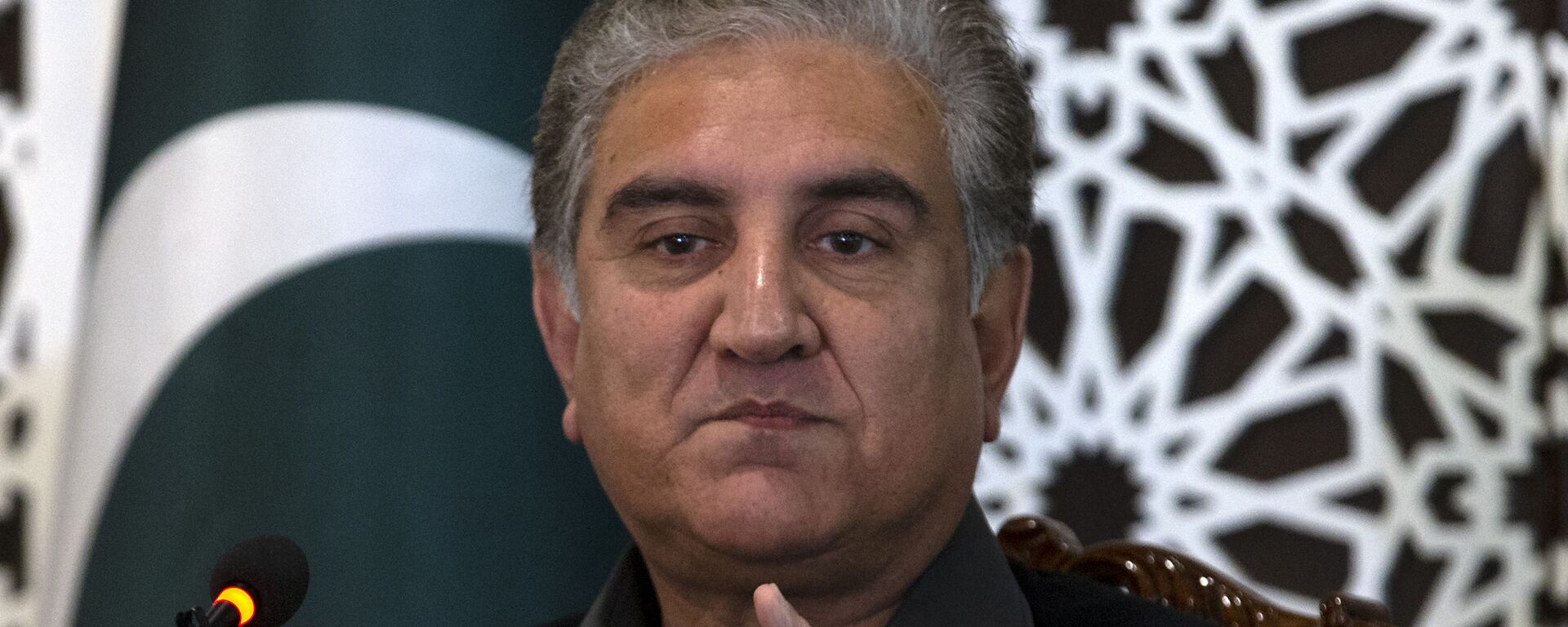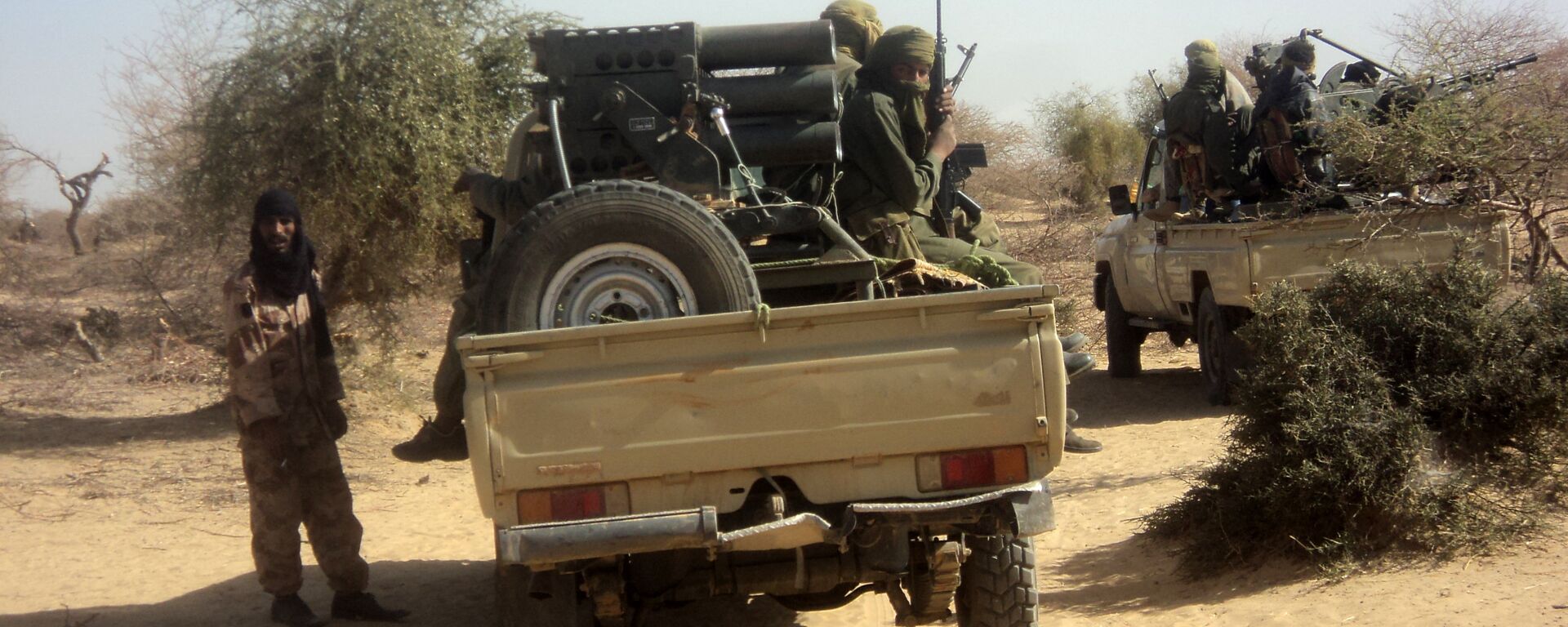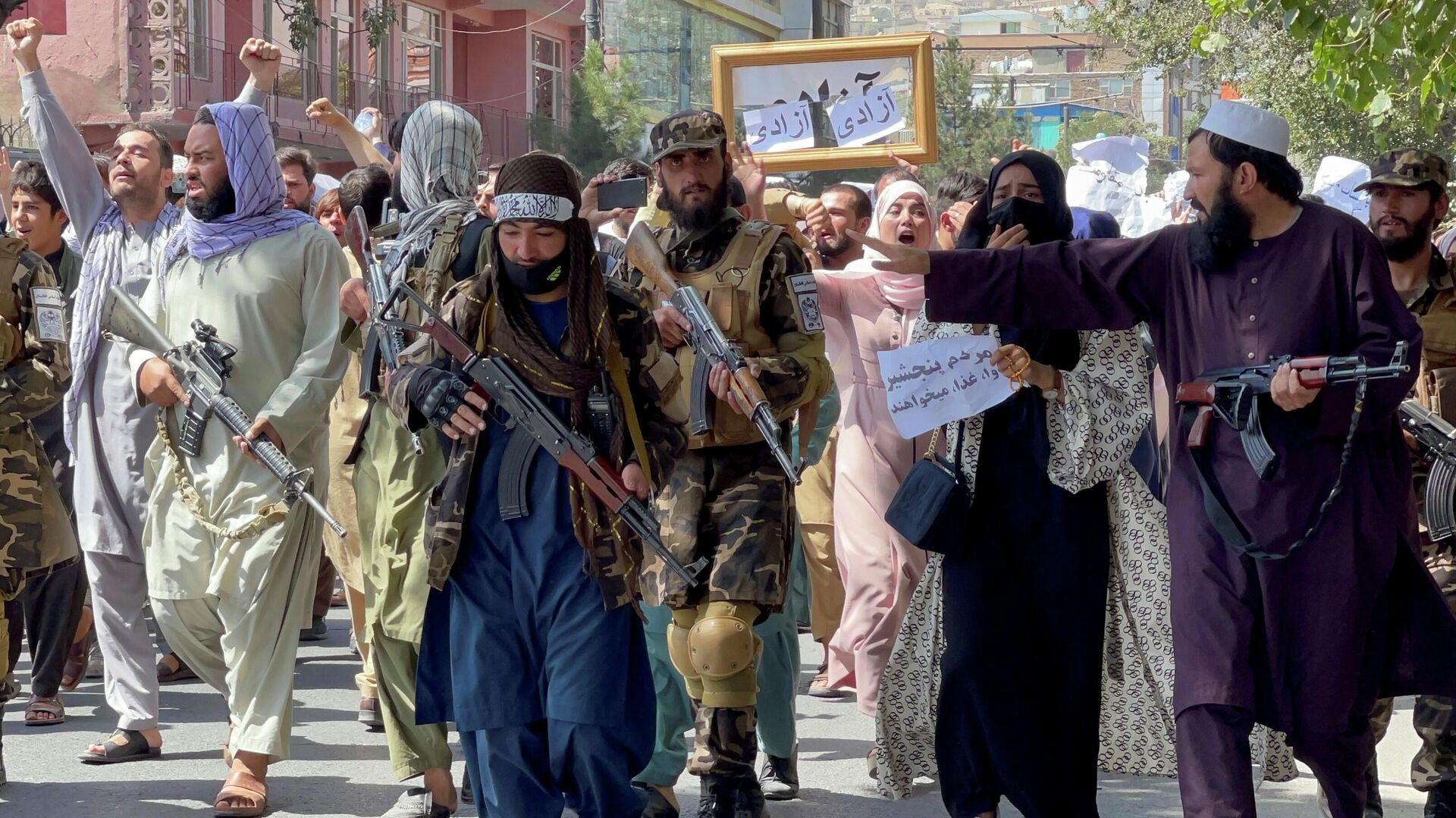https://sputnikglobe.com/20210917/pakistan-will-get-badly-burnt-if-it-courts-the-taliban-beyond-a-point-warns-author-1089151573.html
Pakistan Will Get ‘Badly Burnt’ If It Courts the Taliban Beyond a Point, Warns Author
Pakistan Will Get ‘Badly Burnt’ If It Courts the Taliban Beyond a Point, Warns Author
Sputnik International
Pakistan’s PM Imran Khan reacted to the Taliban* takeover of Afghanistan by proclaiming that Afghans “have broken the shackles of slavery”. Islamabad has taken... 17.09.2021, Sputnik International
2021-09-17T12:57+0000
2021-09-17T12:57+0000
2022-12-08T18:02+0000
afghanistan
tehrik-i-taliban pakistan (ttp)
imran khan
afghanistan
stockholm university
newsfeed
asia
pakistan
https://cdn1.img.sputnikglobe.com/img/07e5/09/07/1088855449_0:0:3215:1808_1920x0_80_0_0_e05beeb0af182eafaa5a755c1ffa5ce4.jpg
Dr Ishtiaq Ahmed, a professor emeritus of political science at Stockholm University and an acclaimed Pakistani-origin author, has warned that Islamabad is “playing with fire” in courting the Taliban and lobbying foreign governments to recognise the new rulers in Afghanistan.The professor emeritus goes on to point out that “radical elements” within Pakistan had already been emboldened by the success of the Taliban next door in Afghanistan.He, however, also feels that the scrutiny of Pakistan’s role in allegedly supporting terrorist groups has led to jihadist sympathisers adopting a more cautious public approach in recent years.The seizure of power by the Taliban in Afghanistan has been hailed as a major milestone by Pakistan’s top religious outfits, including Jamiat Ulema-i-Islam-Fazl (JUI-F) and Jamaat-i-Islami (JI), both having political representations in the Pakistani Senate and the National Assembly, as well as several provincial parliaments. In provinces such as Khyber-Pakhtunkhwa (KPK), the home turf of the US-designated dreaded terror outfit the Haqqani Network, the Islamic fundamentalist parties are represented in bigger numbers than in the federal parliament.In the lead-up to the fall of Kabul, political rallies in support of the Taliban were witnessed in Balochistan, KPK, as well as Waziristan.Besides the threat of radical Islamists gaining more prominence in the political establishment, an imminent threat facing Pakistan is the resurgence of the Tehrik-i-Taliban Pakistan (TTP), a faction of the Afghan Taliban which mobilised its cadre in 2020 after years of infighting. A United Nations Security Council (UNSC) report published in June said that Al-Qaeda* was instrumental in bringing together different factions within the TTP, designated as a foreign terrorist organisation (FTO) by the US State Department in 2010.The report stated that the group is led by Noor Wali Mehsud and supported the Afghan Taliban in the “military operations” against the Afghan National Security Forces (ANSF). Its base is in Nangarhar province, located at the Pakistan border.The TTP, whose stated aim is to overthrow the Pakistani government through a jihadist campaign, has reportedly claimed responsibility for over 1,800 terrorist attacks within the South Asian nation in the last decade or so.According to Pakistani media reports, the TTP carried out 32 attacks against Pakistani security forces in August, resulting in the death of 52 army personnel. The group this week claimed one of its biggest attacks in recent years, killing seven Pakistani soldiers in the southern part of the tribal Waziristan province.The former professor at Stockholm University believes that despite close public ties, the Taliban is under “considerable pressure” from Pakistan to “rein in” the TTP.The Taliban has repeatedly assured that it won’t let Afghanistan be used by terrorist groups targeting other countries, which was also one of the conditions for the withdrawal of the US-led foreign forces in the Doha deal of February 2020.The views expressed by the Swedish-Pakistani academic echo concerns over the Taliban’s resurgence raised by several leading Pakistani politicians. Former Interior Minister Rehman Malik warned this week that the Taliban takeover in Afghanistan will have “far-reaching effects” for Pakistan and other neighbouring countries, as he called upon federal authorities to have a “counter-strategy” ready.Meanwhile, federal lawmaker Mohsin Dawar, a leader in the progressive National Democratic Movement (NDM), has claimed that the Taliban is being allowed to “roam freely” in several parts of Pakistan, which he says couldn’t be possible “without state support”.*The Taliban and al-Qaeda are terrorist groups banned in Russia and many other countries.
https://sputnikglobe.com/20210908/pakistan-calls-for-discarding-old-lenses-in-afghanistan-as-talibans-new-cabinet-draws-flak-1088879794.html
https://sputnikglobe.com/20210909/pentagon-chief-explains-why-al-qaeda-has-the-ability-to-regenerate-in-afghanistan-1088919809.html
afghanistan
pakistan
Sputnik International
feedback@sputniknews.com
+74956456601
MIA „Rossiya Segodnya“
2021
News
en_EN
Sputnik International
feedback@sputniknews.com
+74956456601
MIA „Rossiya Segodnya“
Sputnik International
feedback@sputniknews.com
+74956456601
MIA „Rossiya Segodnya“
tehrik-i-taliban pakistan (ttp), imran khan, afghanistan, stockholm university, newsfeed, pakistan
tehrik-i-taliban pakistan (ttp), imran khan, afghanistan, stockholm university, newsfeed, pakistan
Pakistan Will Get ‘Badly Burnt’ If It Courts the Taliban Beyond a Point, Warns Author
12:57 GMT 17.09.2021 (Updated: 18:02 GMT 08.12.2022) Pakistan’s PM Imran Khan reacted to the Taliban* takeover of Afghanistan by proclaiming that Afghans “have broken the shackles of slavery”. Islamabad has taken a leading role in lobbying foreign governments to give the Taliban a “chance”, even as other global powers have said that they would judge the group by its actions and not just words.
Dr Ishtiaq Ahmed, a professor emeritus of political science at Stockholm University and an acclaimed Pakistani-origin author, has warned that Islamabad is “playing with fire” in courting the Taliban and lobbying foreign governments to recognise the new rulers in Afghanistan.
“No doubt that supporting the Taliban is a case of playing with fire and Pakistan can get very badly burnt if it courts the Taliban government beyond a point in the balance of power”, Ahmed warns.
The professor emeritus goes on to point out that “radical elements” within Pakistan had already been emboldened by the success of the Taliban next door in Afghanistan.
He, however, also feels that the scrutiny of Pakistan’s role in allegedly supporting terrorist groups has led to jihadist sympathisers adopting a more cautious public approach in recent years.
“I think the opinion is equally divided between those who consider the Taliban to be an asset and those who deem it as a liability. However, I think that those who consider it an asset will not have the same freedom of action as was possible earlier”, he said.

8 September 2021, 13:48 GMT
The seizure of power by the Taliban in Afghanistan has been hailed as a major milestone by Pakistan’s top religious outfits, including Jamiat Ulema-i-Islam-Fazl (JUI-F) and Jamaat-i-Islami (JI), both having political representations in the Pakistani Senate and the National Assembly, as well as several provincial parliaments. In provinces such as Khyber-Pakhtunkhwa (KPK), the home turf of the US-designated dreaded terror outfit the
Haqqani Network, the Islamic fundamentalist parties are represented in bigger numbers than in the federal parliament.
Hafiz Hussain Ahmed, the leader of the religious Jamiat Ulema-e-Islam party, was quoted as saying by German broadcaster Deutsche Welle (DW) on 16 September that there would be “no harm” if Sharia law is implemented in Pakistan as well.
In the lead-up to the fall of Kabul, political rallies in support of the Taliban were witnessed in Balochistan, KPK, as well as Waziristan.
Besides the threat of radical Islamists gaining more prominence in the political establishment, an imminent threat facing Pakistan is the resurgence of the Tehrik-i-Taliban Pakistan (TTP), a faction of the Afghan Taliban which mobilised its cadre in 2020 after years of infighting. A
United Nations Security Council (UNSC) report published in June said that Al-Qaeda* was instrumental in bringing together different factions within the TTP, designated as a foreign terrorist organisation (FTO) by the US State Department in 2010.
The report stated that the group is led by Noor Wali Mehsud and supported the Afghan Taliban in the “military operations” against the Afghan National Security Forces (ANSF). Its base is in Nangarhar province, located at the Pakistan border.
The TTP, whose stated aim is to overthrow the Pakistani government through a jihadist campaign, has reportedly claimed responsibility for over 1,800 terrorist attacks within the South Asian nation in the last decade or so.
According to Pakistani media reports, the TTP carried out 32 attacks against Pakistani security forces in August, resulting in the death of 52 army personnel. The group this week claimed one of its biggest attacks in recent years, killing seven Pakistani soldiers in the southern part of the tribal Waziristan province.
The former professor at Stockholm University believes that despite close public ties, the Taliban is under “considerable pressure” from Pakistan to “rein in” the TTP.
“The TTP, to a point, has the potential to create friction between Islamabad and the Taliban”, Ahmed remarks.
The Taliban has repeatedly assured that it won’t let Afghanistan be used by terrorist groups targeting other countries, which was also one of the conditions for the withdrawal of the US-led foreign forces in the Doha deal of February 2020.

9 September 2021, 14:34 GMT
The views expressed by the Swedish-Pakistani academic echo concerns over the Taliban’s resurgence raised by several leading Pakistani politicians. Former Interior Minister Rehman Malik warned this week that the Taliban takeover in Afghanistan will have “far-reaching effects” for Pakistan and other neighbouring countries, as he called upon federal authorities to have a “counter-strategy” ready.
Meanwhile, federal lawmaker Mohsin Dawar, a leader in the progressive National Democratic Movement (NDM), has claimed that the Taliban is being allowed to “roam freely” in several parts of Pakistan, which he says couldn’t be possible “without state support”.
*The Taliban and al-Qaeda are terrorist groups banned in Russia and many other countries.




